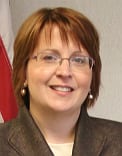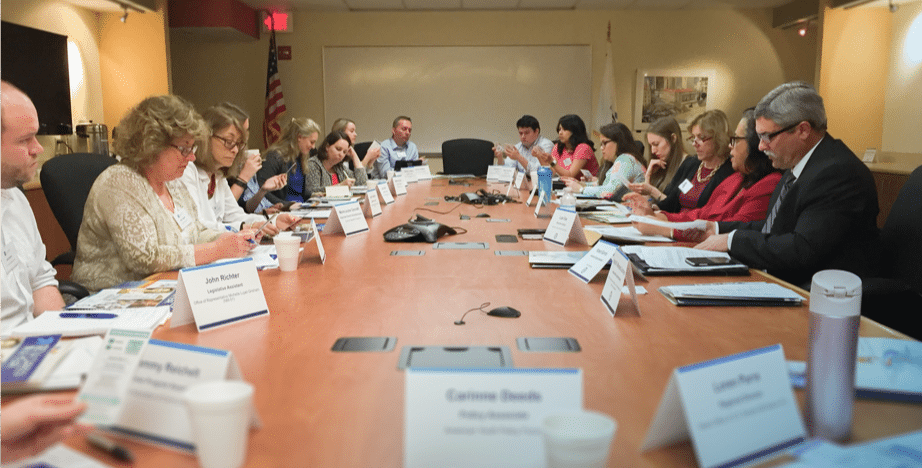Materials
Overview
Researchers strive to identify, create, and test strategies for improving youth-serving programs, practices, and policies and to generate research that deepens our understanding of human behavior, child well-being, and development. However, gaps exist between the research generated about programs and practices shown to be effective and the routine use of these bodies of evidence and packaged programs by youth-serving agencies. In addition, researchers don’t always ask the questions that are challenging decision-makers. According to research from Dr. Lawrence A. Palinkas, research-practice-policy partnerships can be an important strategy for narrowing this gap. While many such partnerships exist, there is much to be learned regarding the roles policymakers and practitioners can play in collaboration, how best to structure these collaborations to maximize their utility, and how partnerships can inform policy and practice in order to yield the most positive outcomes for children. This meeting will explore three different partnership models, as defined in Dr. Palinkas’ white paper prepared for the William T. Grant Foundation.
In this meeting, we: Convened research, policymaking, and practitioner communities who may not normally interact to facilitate relationship building. Explained the different models and the role of researchers, practitioners, and policymakers in each. Identified challenges and opportunities inherent with these types of partnerships. Discussed common elements of successful partnerships. Explored how the use of research in policy and practice varies based on the origins, underlying goals, and life course of the partnership. Participants were encouraged to share the challenges they anticipate in helping this strategy take hold and identify concrete strategies for addressing these obstacles.
Takeaways: Participants will value research-practice-policy partnerships as a tool for (i) strengthening connections between research and decision-makers in child welfare and (ii) better serving children and families. Participants will leave with a more nuanced understanding of the critical role relationships, trust-building, and context-setting play in establishing successful and enduring research/practice partnerships. Participants will identify concrete ideas on how to promote, establish, and sustain these partnerships, as well as questions to consider regarding their local context.
Presenter Biographies
 Leslie Abbey is currently Chief Program Officer at Lantern Community Services, which champions the independence and well-being of New Yorkers who are impacted by or threatened with homelessness. In this role, Leslie oversees all program planning, implementation, and evaluation, including Lantern’s utilization of several evidence-based models. Before joining Lantern in 2014, Leslie served as an Associate Commissioner of New York City Administration for Children’s Services (ACS), where she played a key role on the leadership team in charge of program and policy innovation. During her seven-year tenure at ACS, Leslie spearheaded the development and launch of several large-scale juvenile justice and child welfare initiatives, including an agency-wide expansion of evidence-based practices and the implementation of several LGBTQ policy and practice initiatives. Prior to joining ACS in 2007, Leslie was an attorney in the Legal Aid Society’s Juvenile Rights Practice, and founded Legal Information for Families Today (LIFT), promoting justice for children and families. She is a Board member of LIFT and a trustee of Grace Church School. She earned her B.A. with Honors from Swarthmore College and her J.D. from New York University School of Law.
Leslie Abbey is currently Chief Program Officer at Lantern Community Services, which champions the independence and well-being of New Yorkers who are impacted by or threatened with homelessness. In this role, Leslie oversees all program planning, implementation, and evaluation, including Lantern’s utilization of several evidence-based models. Before joining Lantern in 2014, Leslie served as an Associate Commissioner of New York City Administration for Children’s Services (ACS), where she played a key role on the leadership team in charge of program and policy innovation. During her seven-year tenure at ACS, Leslie spearheaded the development and launch of several large-scale juvenile justice and child welfare initiatives, including an agency-wide expansion of evidence-based practices and the implementation of several LGBTQ policy and practice initiatives. Prior to joining ACS in 2007, Leslie was an attorney in the Legal Aid Society’s Juvenile Rights Practice, and founded Legal Information for Families Today (LIFT), promoting justice for children and families. She is a Board member of LIFT and a trustee of Grace Church School. She earned her B.A. with Honors from Swarthmore College and her J.D. from New York University School of Law.
 Donna Bradbury directs the Division of Integrated Community Services for Children and Families at the Office of Mental Health. She oversees all community-based children’s mental health programs in New York State. She is currently leading the effort to transition children’s behavioral health services into Medicaid managed care as part of the larger Medicaid Redesign project.
Donna Bradbury directs the Division of Integrated Community Services for Children and Families at the Office of Mental Health. She oversees all community-based children’s mental health programs in New York State. She is currently leading the effort to transition children’s behavioral health services into Medicaid managed care as part of the larger Medicaid Redesign project.
Prior to state service, Donna worked for twelve years for the Rensselaer County Department of Mental Health. She delivered clinical services to children and their families, served as a consultant to Family Court as well as county-operated human service departments and schools, ran a specialized treatment program which successfully prevented institutional placement for many youth, and assisted in the creation and implementation of several interagency initiatives that resulted in children and their families having easier access to better quality services.
 Dr. Patricia Chamberlain’s interest in developing interventions for children and families emerged from her early work as a special education teacher. She has conducted several studies on treatment for children, youth, and families in the child welfare, juvenile justice, and mental health systems. She founded the Treatment Foster Care Oregon (formerly Multidimensional Treatment Foster Care/MTFC; www.tfcoregon.com) and KEEP (www.keepfostering.org) intervention models. TFCO is an alternative to group, residential, and institutional placement for youngsters with severe antisocial behavior and mental health problems. KEEP provides enhanced support and training to state foster and kinship parents to prevent placement disruptions, improve reunification rates, and reduce child behavioral and emotional problems. TFCO and KEEP are being widely implemented throughout the United States and in Europe (see www.tfcoregon.com and keepfostering.org). She has been the Principal Investigator on 9 randomized trials examining the efficacy of parent mediated intervention approaches. Chamberlain is a senior fellow at the Society for Prevention Research. Dr. Chamberlain was inducted into the first cohort of Society for Prevention Research SPR Fellows in 2013.
Dr. Patricia Chamberlain’s interest in developing interventions for children and families emerged from her early work as a special education teacher. She has conducted several studies on treatment for children, youth, and families in the child welfare, juvenile justice, and mental health systems. She founded the Treatment Foster Care Oregon (formerly Multidimensional Treatment Foster Care/MTFC; www.tfcoregon.com) and KEEP (www.keepfostering.org) intervention models. TFCO is an alternative to group, residential, and institutional placement for youngsters with severe antisocial behavior and mental health problems. KEEP provides enhanced support and training to state foster and kinship parents to prevent placement disruptions, improve reunification rates, and reduce child behavioral and emotional problems. TFCO and KEEP are being widely implemented throughout the United States and in Europe (see www.tfcoregon.com and keepfostering.org). She has been the Principal Investigator on 9 randomized trials examining the efficacy of parent mediated intervention approaches. Chamberlain is a senior fellow at the Society for Prevention Research. Dr. Chamberlain was inducted into the first cohort of Society for Prevention Research SPR Fellows in 2013.
 Dr. John Landsverk has a doctorate in sociology and advanced training in epidemiology and mental health services research. Dr. Landsverk is a Senior Research Scientist at the Oregon Social Learning Center (OSLC), Science Director of the OSLC Developments Inc, and Founding Director of the Child and Adolescent Services Research Center (CASRC) at Rady Children’s Hospital – San Diego. He also has an appointment as Senior Scholar at the Brown School of Social Work, Washington University in St. Louis and Senior Research Professor at the School of Social Work, University of Southern California.
Dr. John Landsverk has a doctorate in sociology and advanced training in epidemiology and mental health services research. Dr. Landsverk is a Senior Research Scientist at the Oregon Social Learning Center (OSLC), Science Director of the OSLC Developments Inc, and Founding Director of the Child and Adolescent Services Research Center (CASRC) at Rady Children’s Hospital – San Diego. He also has an appointment as Senior Scholar at the Brown School of Social Work, Washington University in St. Louis and Senior Research Professor at the School of Social Work, University of Southern California.
His research studies focus on the intersection of child welfare and children’s mental health with an emphasis on the implementation of evidence based interventions in these service systems. Dr. Landsverk has received numerous research grants and contracts from the National Institute of Mental Health (NIMH) and other federal agencies, including three center grants, the most recent the advanced center Implementation Methods Research Group (IMRG), focused on developing methods and strategies for implementing evidence-based interventions in child welfare and child mental health settings.
 Dr. Mary McKay joined New York University Silver School of Social Work in September 2011 as Professor and Director of the McSilver Institute for Poverty Policy and Research. Prior to joining Silver, she served as the Head of the Division of Mental Health Services Research at Mount Sinai. She has received substantial federal funding for research focused on meeting the mental health and health prevention needs of inner-city youth and families. Working with colleagues in the field, she developed a substantial body of research findings around engagement practices to improve involvement in family-based HIV prevention programs and mental health services for children, youth, and families in poverty-impacted urban areas. She has significant expertise in services and implementation research methods, as well as over 15 years of experience conducting HIV prevention and care oriented studies, all of which has been supported by continuous NIH funding. In addition, she has collaborated with the National Institute of Mental Health, the New York State Office of Mental Health, and the New York City Department of Health and Mental Hygiene to create evidence-based engagement interventions and to test models of dissemination and training for mental health professionals in engagement best practices. She has published over 100 peer-reviewed journal articles on mental and behavioral health, HIV/AIDS prevention and behavior modification, and other urban health issues, and
Dr. Mary McKay joined New York University Silver School of Social Work in September 2011 as Professor and Director of the McSilver Institute for Poverty Policy and Research. Prior to joining Silver, she served as the Head of the Division of Mental Health Services Research at Mount Sinai. She has received substantial federal funding for research focused on meeting the mental health and health prevention needs of inner-city youth and families. Working with colleagues in the field, she developed a substantial body of research findings around engagement practices to improve involvement in family-based HIV prevention programs and mental health services for children, youth, and families in poverty-impacted urban areas. She has significant expertise in services and implementation research methods, as well as over 15 years of experience conducting HIV prevention and care oriented studies, all of which has been supported by continuous NIH funding. In addition, she has collaborated with the National Institute of Mental Health, the New York State Office of Mental Health, and the New York City Department of Health and Mental Hygiene to create evidence-based engagement interventions and to test models of dissemination and training for mental health professionals in engagement best practices. She has published over 100 peer-reviewed journal articles on mental and behavioral health, HIV/AIDS prevention and behavior modification, and other urban health issues, and
 Lawrence Palinkas is the Albert G. and Frances Lomas Feldman Professor of Social Policy and Health and Chair of the Department of Child, Youth and Families at the University of Southern California. He also holds secondary appointments as Professor in the Departments of Anthropology and Preventive Medicine at USC. Dr. Palinkas received his B.A. in Anthropology from the University of Chicago in 1974 and an MA and Ph.D. in Anthropology from the University of California, San Diego in 1975 and 1981, respectively. Prior to coming to USC, he was Professor and Vice Chair of Family and Preventive Medicine at the University of California, San Diego. He has also been a visiting professor at the Peking Union Medical College in China, the University of Oulu in Finland, and the School of Public Health at the University of California, Berkeley.
Lawrence Palinkas is the Albert G. and Frances Lomas Feldman Professor of Social Policy and Health and Chair of the Department of Child, Youth and Families at the University of Southern California. He also holds secondary appointments as Professor in the Departments of Anthropology and Preventive Medicine at USC. Dr. Palinkas received his B.A. in Anthropology from the University of Chicago in 1974 and an MA and Ph.D. in Anthropology from the University of California, San Diego in 1975 and 1981, respectively. Prior to coming to USC, he was Professor and Vice Chair of Family and Preventive Medicine at the University of California, San Diego. He has also been a visiting professor at the Peking Union Medical College in China, the University of Oulu in Finland, and the School of Public Health at the University of California, Berkeley.


